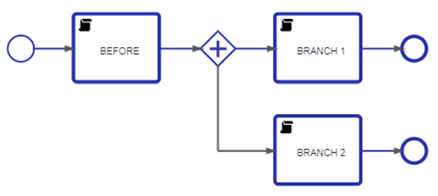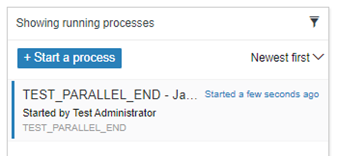Describe the bug
In 6.5.0, if one tries to delete a deployment while it has active process instance, the action corrupt the database in a way that one can still see the process definition, but it is no longer associated with a deployment ID. There is no way to delete this process definition anymore.
Here is how to reproduce it using flowable REST API
- Deploy a process definition
curl --user rest-admin:test -F "[email protected]" http://myserver:8080/demo-flowable/process-api/repository/deployments
- Start a process instance:
{ "processDefinitionKey":"myprocess", "variables": [ { "name":"employee", "value": "John Houser" }, { "name":"applicationId", "value": "MyApp" }, { "name":"logonId", "value": "jhouser" }, { "name":"password", "value": "**********" }, { "name":"approverRequired", "value": true }, { "name":"approvers", "value":"" }, { "name":"approverGroups", "value":"approvers" }, { "name":"subject", "value": "Please approve request" }, { "name":"message", "value": "Please approve this request as soon as possible" }]}
- Delete the deployment:
DELETE http://myserver:8080/flowable-rest/service/repository/deployments/9c3bcead-4e8a-11ea-be15-00155d7357f8
ERROR:
{
"message": "Internal server error",
"exception": "\r\n### Error updating database. Cause: com.microsoft.sqlserver.jdbc.SQLServerException: The DELETE statement conflicted with the REFERENCE constraint "ACT_FK_EXE_PROCDEF". The conflict occurred in database "winchester-flowable", table "dbo.ACT_RU_EXECUTION", column 'PROC_DEF_ID_'.\r\n### The error may exist in org/flowable/db/mapping/entity/ProcessDefinition.xml\r\n### The error may involve org.flowable.engine.impl.persistence.entity.ProcessDefinitionEntityImpl.deleteProcessDefinitionsByDeploymentId-Inline\r\n### The error occurred while setting parameters\r\n### SQL: delete from ACT_RE_PROCDEF where DEPLOYMENT_ID_ = ?\r\n### Cause: com.microsoft.sqlserver.jdbc.SQLServerException: The DELETE statement conflicted with the REFERENCE constraint "ACT_FK_EXE_PROCDEF". The conflict occurred in database "winchester-flowable", table "dbo.ACT_RU_EXECUTION", column 'PROC_DEF_ID_'."
}
- Get the process-definition: GET http://.../repository/process-definitions
One can still see the process definition. But click on deploymentUrl link, one gets:
{"message":"Not found","exception":"Could not find a deployment with id '9c3bcead-4e8a-11ea-be15-00155d7357f8'."}
- I thought I could just delete the process instance and then come back to delete the deployment, but that does not work: server throws exception:
DELETE http://.../runtime/process-instances/a5a41a21-4e8a-11ea-be15-00155d7357f8
org.apache.ibatis.exceptions.PersistenceException:
Error updating database. Cause: com.microsoft.sqlserver.jdbc.SQLServerException: Violation of PRIMARY KEY constraint 'PK__ACT_ID_M__C2371B0F4C64F7B2'. Cannot insert duplicate key in object 'dbo.ACT_ID_MEMBERSHIP'. The duplicate key value is (hwinston, specialists).
The error may exist in org/flowable/idm/db/mapping/entity/Membership.xml
The error may involve org.flowable.idm.engine.impl.persistence.entity.MembershipEntityImpl.insertMembership-Inline
The error occurred while setting parameters
SQL: insert into ACT_ID_MEMBERSHIP (USER_ID_, GROUP_ID_) values ( ?, ? )
Cause: com.microsoft.sqlserver.jdbc.SQLServerException: Violation of PRIMARY KEY constraint 'PK__ACT_ID_M__C2371B0F4C64F7B2'. Cannot insert duplicate key in object 'dbo.ACT_ID_MEMBERSHIP'. The duplicate key value is (hwinston, specialists).
at org.apache.ibatis.exceptions.ExceptionFactory.wrapException(ExceptionFactory.java:30) ~[mybatis-3.5.3.jar:3.5.3]
at org.apache.ibatis.session.defaults.DefaultSqlSession.update(DefaultSqlSession.java:199) ~[mybatis-3.5.3.jar:3.5.3]
at org.apache.ibatis.session.defaults.DefaultSqlSession.insert(DefaultSqlSession.java:184) ~[mybatis-3.5.3.jar:3.5.3]
at org.flowable.common.engine.impl.db.DbSqlSession.flushRegularInsert(DbSqlSession.java:509) ~[flowable-engine-common-6.5.0.jar:6.5.0]
at org.flowable.common.engine.impl.db.DbSqlSession.flushInsertEntities(DbSqlSession.java:490) ~[flowable-engine-common-6.5.0.jar:6.5.0]
at org.flowable.common.engine.impl.db.DbSqlSession.flushInserts(DbSqlSession.java:473) ~[flowable-engine-common-6.5.0.jar:6.5.0]
at org.flowable.common.engine.impl.db.DbSqlSession.flush(DbSqlSession.java:358) ~[flowable-engine-common-6.5.0.jar:6.5.0]
at org.flowable.common.engine.impl.interceptor.CommandContext.flushSessions(CommandContext.java:192) ~[flowable-engine-common-6.5.0.jar:6.5.0]
at org.flowable.common.engine.impl.interceptor.CommandContext.close(CommandContext.java:61) ~[flowable-engine-common-6.5.0.jar:6.5.0]
at org.flowable.common.engine.impl.interceptor.CommandContextInterceptor.execute(CommandContextInterceptor.java:81) ~[flowable-engine-common-6.5.0.jar:6.5.0]
at org.flowable.common.spring.SpringTransactionInterceptor.execute(SpringTransactionInterceptor.java:51) ~[flowable-spring-common-6.5.0.jar:6.5.0]
at org.flowable.common.engine.impl.interceptor.LogInterceptor.execute(LogInterceptor.java:30) ~[flowable-engine-common-6.5.0.jar:6.5.0]
at org.flowable.common.engine.impl.cfg.CommandExecutorImpl.execute(CommandExecutorImpl.java:56) ~[flowable-engine-common-6.5.0.jar:6.5.0]
at org.flowable.common.engine.impl.cfg.CommandExecutorImpl.execute(CommandExecutorImpl.java:51) ~[flowable-engine-common-6.5.0.jar:6.5.0]
at org.flowable.idm.engine.impl.IdmIdentityServiceImpl.createMembership(IdmIdentityServiceImpl.java:118) ~[flowable-idm-engine-6.5.0.jar:6.5.0]
at org.flowable.ui.idm.service.GroupServiceImpl.addGroupMember(GroupServiceImpl.java:128) ~[flowable-ui-idm-logic-6.5.0.jar:6.5.0]
at jdk.internal.reflect.NativeMethodAccessorImpl.invoke0(Native Method) ~[?:?]
at jdk.internal.reflect.NativeMethodAccessorImpl.invoke(NativeMethodAccessorImpl.java:62) ~[?:?]
at jdk.internal.reflect.DelegatingMethodAccessorImpl.invoke(DelegatingMethodAccessorImpl.java:43) ~[?:?]
at java.lang.reflect.Method.invoke(Method.java:566) ~[?:?]
at org.springframework.aop.support.AopUtils.invokeJoinpointUsingReflection(AopUtils.java:344) ~[spring-aop-5.2.2.RELEASE.jar:5.2.2.RELEASE]
at org.springframework.aop.framework.ReflectiveMethodInvocation.invokeJoinpoint(ReflectiveMethodInvocation.java:198) ~[spring-aop-5.2.2.RELEASE.jar:5.2.2.RELEASE]
at org.springframework.aop.framework.ReflectiveMethodInvocation.proceed(ReflectiveMethodInvocation.java:163) ~[spring-aop-5.2.2.RELEASE.jar:5.2.2.RELEASE]
at org.springframework.transaction.interceptor.TransactionAspectSupport.invokeWithinTransaction(TransactionAspectSupport.java:366) ~[spring-tx-5.2.2.RELEASE.jar:5.2.2.RELEASE]
at org.springframework.transaction.interceptor.TransactionInterceptor.invoke(TransactionInterceptor.java:99) ~[spring-tx-5.2.2.RELEASE.jar:5.2.2.RELEASE]
at org.springframework.aop.framework.ReflectiveMethodInvocation.proceed(ReflectiveMethodInvocation.java:186) ~[spring-aop-5.2.2.RELEASE.jar:5.2.2.RELEASE]
at org.springframework.aop.framework.JdkDynamicAopProxy.invoke(JdkDynamicAopProxy.java:212) ~[spring-aop-5.2.2.RELEASE.jar:5.2.2.RELEASE]
at com.sun.proxy.$Proxy146.addGroupMember(Unknown Source) ~[?:?]
at org.flowable.ui.idm.rest.app.IdmGroupsResource.addGroupMember(IdmGroupsResource.java:98) ~[flowable-ui-idm-rest-6.5.0.jar:6.5.0]
at jdk.internal.reflect.NativeMethodAccessorImpl.invoke0(Native Method) ~[?:?]
at jdk.internal.reflect.NativeMethodAccessorImpl.invoke(NativeMethodAccessorImpl.java:62) ~[?:?]
at jdk.internal.reflect.DelegatingMethodAccessorImpl.invoke(DelegatingMethodAccessorImpl.java:43) ~[?:?]
at java.lang.reflect.Method.invoke(Method.java:566) ~[?:?]
at org.springframework.web.method.support.InvocableHandlerMethod.doInvoke(InvocableHandlerMethod.java:190) ~[spring-web-5.2.2.RELEASE.jar:5.2.2.RELEASE]
at org.springframework.web.method.support.InvocableHandlerMethod.invokeForRequest(InvocableHandlerMethod.java:138) ~[spring-web-5.2.2.RELEASE.jar:5.2.2.RELEASE]
at org.springframework.web.servlet.mvc.method.annotation.ServletInvocableHandlerMethod.invokeAndHandle(ServletInvocableHandlerMethod.java:106) ~[spring-webmvc-5.2.2.RELEASE.jar:5.2.2.RELEASE]
at org.springframework.web.servlet.mvc.method.annotation.RequestMappingHandlerAdapter.invokeHandlerMethod(RequestMappingHandlerAdapter.java:888) ~[spring-webmvc-5.2.2.RELEASE.jar:5.2.2.RELEASE]
at org.springframework.web.servlet.mvc.method.annotation.RequestMappingHandlerAdapter.handleInternal(RequestMappingHandlerAdapter.java:793) ~[spring-webmvc-5.2.2.RELEASE.jar:5.2.2.RELEASE]
at org.springframework.web.servlet.mvc.method.AbstractHandlerMethodAdapter.handle(AbstractHandlerMethodAdapter.java:87) ~[spring-webmvc-5.2.2.RELEASE.jar:5.2.2.RELEASE]
at org.springframework.web.servlet.DispatcherServlet.doDispatch(DispatcherServlet.java:1040) ~[spring-webmvc-5.2.2.RELEASE.jar:5.2.2.RELEASE]
at org.springframework.web.servlet.DispatcherServlet.doService(DispatcherServlet.java:943) ~[spring-webmvc-5.2.2.RELEASE.jar:5.2.2.RELEASE]
at org.springframework.web.servlet.FrameworkServlet.processRequest(FrameworkServlet.java:1006) ~[spring-webmvc-5.2.2.RELEASE.jar:5.2.2.RELEASE]
at org.springframework.web.servlet.FrameworkServlet.doPost(FrameworkServlet.java:909) ~[spring-webmvc-5.2.2.RELEASE.jar:5.2.2.RELEASE]
at javax.servlet.http.HttpServlet.service(HttpServlet.java:707) ~[servlet-api-3.1.jar:3.1.0]
at org.springframework.web.servlet.FrameworkServlet.service(FrameworkServlet.java:883) ~[spring-webmvc-5.2.2.RELEASE.jar:5.2.2.RELEASE]
at javax.servlet.http.HttpServlet.service(HttpServlet.java:790) ~[servlet-api-3.1.jar:3.1.0]
at org.eclipse.jetty.servlet.ServletHolder.handle(ServletHolder.java:755) ~[jetty-servlet-9.4.26.v20200117.jar:9.4.26.v20200117]
at org.eclipse.jetty.servlet.ServletHandler$CachedChain.doFilter(ServletHandler.java:1617) ~[jetty-servlet-9.4.26.v20200117.jar:9.4.26.v20200117]
at org.eclipse.jetty.websocket.server.WebSocketUpgradeFilter.doFilter(WebSocketUpgradeFilter.java:226) ~[websocket-server-9.4.26.v20200117.jar:9.4.26.v20200117]
at org.eclipse.jetty.servlet.ServletHandler$CachedChain.doFilter(ServletHandler.java:1604) ~[jetty-servlet-9.4.26.v20200117.jar:9.4.26.v20200117]
at org.springframework.security.web.FilterChainProxy$VirtualFilterChain.doFilter(FilterChainProxy.java:320) ~[spring-security-web-5.2.1.RELEASE.jar:5.2.1.RELEASE]
at org.springframework.security.web.access.intercept.FilterSecurityInterceptor.invoke(FilterSecurityInterceptor.java:126) ~[spring-security-web-5.2.1.RELEASE.jar:5.2.1.RELEASE]
at org.springframework.security.web.access.intercept.FilterSecurityInterceptor.doFilter(FilterSecurityInterceptor.java:90) ~[spring-security-web-5.2.1.RELEASE.jar:5.2.1.RELEASE]
at org.springframework.security.web.FilterChainProxy$VirtualFilterChain.doFilter(FilterChainProxy.java:334) ~[spring-security-web-5.2.1.RELEASE.jar:5.2.1.RELEASE]
at org.springframework.security.web.access.ExceptionTranslationFilter.doFilter(ExceptionTranslationFilter.java:118) ~[spring-security-web-5.2.1.RELEASE.jar:5.2.1.RELEASE]
at org.springframework.security.web.FilterChainProxy$VirtualFilterChain.doFilter(FilterChainProxy.java:334) ~[spring-security-web-5.2.1.RELEASE.jar:5.2.1.RELEASE]
at org.springframework.security.web.session.SessionManagementFilter.doFilter(SessionManagementFilter.java:137) ~[spring-security-web-5.2.1.RELEASE.jar:5.2.1.RELEASE]
at org.springframework.security.web.FilterChainProxy$VirtualFilterChain.doFilter(FilterChainProxy.java:334) ~[spring-security-web-5.2.1.RELEASE.jar:5.2.1.RELEASE]
at org.springframework.security.web.authentication.AnonymousAuthenticationFilter.doFilter(AnonymousAuthenticationFilter.java:111) ~[spring-security-web-5.2.1.RELEASE.jar:5.2.1.RELEASE]
at org.springframework.security.web.FilterChainProxy$VirtualFilterChain.doFilter(FilterChainProxy.java:334) ~[spring-security-web-5.2.1.RELEASE.jar:5.2.1.RELEASE]
at org.springframework.security.web.authentication.rememberme.RememberMeAuthenticationFilter.doFilter(RememberMeAuthenticationFilter.java:150) ~[spring-security-web-5.2.1.RELEASE.jar:5.2.1.RELEASE]
at org.springframework.security.web.FilterChainProxy$VirtualFilterChain.doFilter(FilterChainProxy.java:334) ~[spring-security-web-5.2.1.RELEASE.jar:5.2.1.RELEASE]
at org.springframework.security.web.servletapi.SecurityContextHolderAwareRequestFilter.doFilter(SecurityContextHolderAwareRequestFilter.java:158) ~[spring-security-web-5.2.1.RELEASE.jar:5.2.1.RELEASE]
at org.springframework.security.web.FilterChainProxy$VirtualFilterChain.doFilter(FilterChainProxy.java:334) ~[spring-security-web-5.2.1.RELEASE.jar:5.2.1.RELEASE]
at org.springframework.security.web.savedrequest.RequestCacheAwareFilter.doFilter(RequestCacheAwareFilter.java:63) ~[spring-security-web-5.2.1.RELEASE.jar:5.2.1.RELEASE]
at org.springframework.security.web.FilterChainProxy$VirtualFilterChain.doFilter(FilterChainProxy.java:334) ~[spring-security-web-5.2.1.RELEASE.jar:5.2.1.RELEASE]
at org.springframework.security.web.authentication.AbstractAuthenticationProcessingFilter.doFilter(AbstractAuthenticationProcessingFilter.java:200) ~[spring-security-web-5.2.1.RELEASE.jar:5.2.1.RELEASE]
at org.springframework.security.web.FilterChainProxy$VirtualFilterChain.doFilter(FilterChainProxy.java:334) ~[spring-security-web-5.2.1.RELEASE.jar:5.2.1.RELEASE]
at org.springframework.security.web.authentication.logout.LogoutFilter.doFilter(LogoutFilter.java:116) ~[spring-security-web-5.2.1.RELEASE.jar:5.2.1.RELEASE]
at org.springframework.security.web.FilterChainProxy$VirtualFilterChain.doFilter(FilterChainProxy.java:334) ~[spring-security-web-5.2.1.RELEASE.jar:5.2.1.RELEASE]
at org.springframework.security.web.header.HeaderWriterFilter.doHeadersAfter(HeaderWriterFilter.java:92) ~[spring-security-web-5.2.1.RELEASE.jar:5.2.1.RELEASE]
at org.springframework.security.web.header.HeaderWriterFilter.doFilterInternal(HeaderWriterFilter.java:77) ~[spring-security-web-5.2.1.RELEASE.jar:5.2.1.RELEASE]
at org.springframework.web.filter.OncePerRequestFilter.doFilter(OncePerRequestFilter.java:119) ~[spring-web-5.2.2.RELEASE.jar:5.2.2.RELEASE]
at org.springframework.security.web.FilterChainProxy$VirtualFilterChain.doFilter(FilterChainProxy.java:334) ~[spring-security-web-5.2.1.RELEASE.jar:5.2.1.RELEASE]
at org.springframework.security.web.context.SecurityContextPersistenceFilter.doFilter(SecurityContextPersistenceFilter.java:105) ~[spring-security-web-5.2.1.RELEASE.jar:5.2.1.RELEASE]
at org.springframework.security.web.FilterChainProxy$VirtualFilterChain.doFilter(FilterChainProxy.java:334) ~[spring-security-web-5.2.1.RELEASE.jar:5.2.1.RELEASE]
at org.springframework.security.web.context.request.async.WebAsyncManagerIntegrationFilter.doFilterInternal(WebAsyncManagerIntegrationFilter.java:56) ~[spring-security-web-5.2.1.RELEASE.jar:5.2.1.RELEASE]
at org.springframework.web.filter.OncePerRequestFilter.doFilter(OncePerRequestFilter.java:119) ~[spring-web-5.2.2.RELEASE.jar:5.2.2.RELEASE]
at org.springframework.security.web.FilterChainProxy$VirtualFilterChain.doFilter(FilterChainProxy.java:334) ~[spring-security-web-5.2.1.RELEASE.jar:5.2.1.RELEASE]
at org.springframework.security.web.FilterChainProxy.doFilterInternal(FilterChainProxy.java:215) ~[spring-security-web-5.2.1.RELEASE.jar:5.2.1.RELEASE]
at org.springframework.security.web.FilterChainProxy.doFilter(FilterChainProxy.java:178) ~[spring-security-web-5.2.1.RELEASE.jar:5.2.1.RELEASE]
at org.springframework.web.filter.DelegatingFilterProxy.invokeDelegate(DelegatingFilterProxy.java:358) ~[spring-web-5.2.2.RELEASE.jar:5.2.2.RELEASE]
at org.springframework.web.filter.DelegatingFilterProxy.doFilter(DelegatingFilterProxy.java:271) ~[spring-web-5.2.2.RELEASE.jar:5.2.2.RELEASE]
at org.eclipse.jetty.servlet.ServletHandler$CachedChain.doFilter(ServletHandler.java:1604) ~[jetty-servlet-9.4.26.v20200117.jar:9.4.26.v20200117]
at org.springframework.web.filter.RequestContextFilter.doFilterInternal(RequestContextFilter.java:100) ~[spring-web-5.2.2.RELEASE.jar:5.2.2.RELEASE]
at org.springframework.web.filter.OncePerRequestFilter.doFilter(OncePerRequestFilter.java:119) ~[spring-web-5.2.2.RELEASE.jar:5.2.2.RELEASE]
at org.eclipse.jetty.servlet.ServletHandler$CachedChain.doFilter(ServletHandler.java:1604) ~[jetty-servlet-9.4.26.v20200117.jar:9.4.26.v20200117]
at org.springframework.web.filter.FormContentFilter.doFilterInternal(FormContentFilter.java:93) ~[spring-web-5.2.2.RELEASE.jar:5.2.2.RELEASE]
at org.springframework.web.filter.OncePerRequestFilter.doFilter(OncePerRequestFilter.java:119) ~[spring-web-5.2.2.RELEASE.jar:5.2.2.RELEASE]
at org.eclipse.jetty.servlet.ServletHandler$CachedChain.doFilter(ServletHandler.java:1604) ~[jetty-servlet-9.4.26.v20200117.jar:9.4.26.v20200117]
at org.springframework.boot.web.servlet.support.ErrorPageFilter.doFilter(ErrorPageFilter.java:128) ~[spring-boot-2.2.2.RELEASE.jar:2.2.2.RELEASE]
at org.springframework.boot.web.servlet.support.ErrorPageFilter.access$000(ErrorPageFilter.java:66) ~[spring-boot-2.2.2.RELEASE.jar:2.2.2.RELEASE]
at org.springframework.boot.web.servlet.support.ErrorPageFilter$1.doFilterInternal(ErrorPageFilter.java:103) ~[spring-boot-2.2.2.RELEASE.jar:2.2.2.RELEASE]
at org.springframework.web.filter.OncePerRequestFilter.doFilter(OncePerRequestFilter.java:119) ~[spring-web-5.2.2.RELEASE.jar:5.2.2.RELEASE]
at org.springframework.boot.web.servlet.support.ErrorPageFilter.doFilter(ErrorPageFilter.java:121) ~[spring-boot-2.2.2.RELEASE.jar:2.2.2.RELEASE]
at org.eclipse.jetty.servlet.ServletHandler$CachedChain.doFilter(ServletHandler.java:1604) ~[jetty-servlet-9.4.26.v20200117.jar:9.4.26.v20200117]
at org.springframework.boot.actuate.metrics.web.servlet.WebMvcMetricsFilter.doFilterInternal(WebMvcMetricsFilter.java:108) ~[spring-boot-actuator-2.2.2.RELEASE.jar:2.2.2.RELEASE]
at org.springframework.web.filter.OncePerRequestFilter.doFilter(OncePerRequestFilter.java:119) ~[spring-web-5.2.2.RELEASE.jar:5.2.2.RELEASE]
at org.eclipse.jetty.servlet.ServletHandler$CachedChain.doFilter(ServletHandler.java:1604) ~[jetty-servlet-9.4.26.v20200117.jar:9.4.26.v20200117]
at org.springframework.web.filter.CharacterEncodingFilter.doFilterInternal(CharacterEncodingFilter.java:201) ~[spring-web-5.2.2.RELEASE.jar:5.2.2.RELEASE]
at org.springframework.web.filter.OncePerRequestFilter.doFilter(OncePerRequestFilter.java:119) ~[spring-web-5.2.2.RELEASE.jar:5.2.2.RELEASE]
at org.eclipse.jetty.servlet.ServletHandler$CachedChain.doFilter(ServletHandler.java:1604) ~[jetty-servlet-9.4.26.v20200117.jar:9.4.26.v20200117]
at org.eclipse.jetty.servlet.ServletHandler.doHandle(ServletHandler.java:545) ~[jetty-servlet-9.4.26.v20200117.jar:9.4.26.v20200117]
at org.eclipse.jetty.server.handler.ScopedHandler.handle(ScopedHandler.java:143) ~[jetty-server-9.4.26.v20200117.jar:9.4.26.v20200117]
at org.eclipse.jetty.security.SecurityHandler.handle(SecurityHandler.java:566) ~[jetty-security-9.4.26.v20200117.jar:9.4.26.v20200117]
at org.eclipse.jetty.server.handler.HandlerWrapper.handle(HandlerWrapper.java:127) ~[jetty-server-9.4.26.v20200117.jar:9.4.26.v20200117]
at org.eclipse.jetty.server.handler.ScopedHandler.nextHandle(ScopedHandler.java:235) ~[jetty-server-9.4.26.v20200117.jar:9.4.26.v20200117]
at org.eclipse.jetty.server.session.SessionHandler.doHandle(SessionHandler.java:1607) ~[jetty-server-9.4.26.v20200117.jar:9.4.26.v20200117]
at org.eclipse.jetty.server.handler.ScopedHandler.nextHandle(ScopedHandler.java:233) ~[jetty-server-9.4.26.v20200117.jar:9.4.26.v20200117]
at org.eclipse.jetty.server.handler.ContextHandler.doHandle(ContextHandler.java:1297) ~[jetty-server-9.4.26.v20200117.jar:9.4.26.v20200117]
at org.eclipse.jetty.server.handler.ScopedHandler.nextScope(ScopedHandler.java:188) ~[jetty-server-9.4.26.v20200117.jar:9.4.26.v20200117]
at org.eclipse.jetty.servlet.ServletHandler.doScope(ServletHandler.java:485) ~[jetty-servlet-9.4.26.v20200117.jar:9.4.26.v20200117]
at org.eclipse.jetty.server.session.SessionHandler.doScope(SessionHandler.java:1577) ~[jetty-server-9.4.26.v20200117.jar:9.4.26.v20200117]
at org.eclipse.jetty.server.handler.ScopedHandler.nextScope(ScopedHandler.java:186) ~[jetty-server-9.4.26.v20200117.jar:9.4.26.v20200117]
at org.eclipse.jetty.server.handler.ContextHandler.doScope(ContextHandler.java:1212) ~[jetty-server-9.4.26.v20200117.jar:9.4.26.v20200117]
at org.eclipse.jetty.server.handler.ScopedHandler.handle(ScopedHandler.java:141) ~[jetty-server-9.4.26.v20200117.jar:9.4.26.v20200117]
at org.eclipse.jetty.server.handler.ContextHandlerCollection.handle(ContextHandlerCollection.java:221) ~[jetty-server-9.4.26.v20200117.jar:9.4.26.v20200117]
at org.eclipse.jetty.server.handler.HandlerCollection.handle(HandlerCollection.java:146) ~[jetty-server-9.4.26.v20200117.jar:9.4.26.v20200117]
at org.eclipse.jetty.server.handler.HandlerWrapper.handle(HandlerWrapper.java:127) ~[jetty-server-9.4.26.v20200117.jar:9.4.26.v20200117]
at org.eclipse.jetty.rewrite.handler.RewriteHandler.handle(RewriteHandler.java:322) ~[jetty-rewrite-9.4.26.v20200117.jar:9.4.26.v20200117]
at org.eclipse.jetty.server.handler.HandlerWrapper.handle(HandlerWrapper.java:127) ~[jetty-server-9.4.26.v20200117.jar:9.4.26.v20200117]
at org.eclipse.jetty.server.Server.handle(Server.java:500) ~[jetty-server-9.4.26.v20200117.jar:9.4.26.v20200117]
at org.eclipse.jetty.server.HttpChannel.lambda$handle$1(HttpChannel.java:383) ~[jetty-server-9.4.26.v20200117.jar:9.4.26.v20200117]
at org.eclipse.jetty.server.HttpChannel.dispatch(HttpChannel.java:547) [jetty-server-9.4.26.v20200117.jar:9.4.26.v20200117]
at org.eclipse.jetty.server.HttpChannel.handle(HttpChannel.java:375) [jetty-server-9.4.26.v20200117.jar:9.4.26.v20200117]
at org.eclipse.jetty.server.HttpConnection.onFillable(HttpConnection.java:270) [jetty-server-9.4.26.v20200117.jar:9.4.26.v20200117]
at org.eclipse.jetty.io.AbstractConnection$ReadCallback.succeeded(AbstractConnection.java:311) [jetty-io-9.4.26.v20200117.jar:9.4.26.v20200117]
at org.eclipse.jetty.io.FillInterest.fillable(FillInterest.java:103) [jetty-io-9.4.26.v20200117.jar:9.4.26.v20200117]
at org.eclipse.jetty.io.ChannelEndPoint$2.run(ChannelEndPoint.java:117) [jetty-io-9.4.26.v20200117.jar:9.4.26.v20200117]
at org.eclipse.jetty.util.thread.strategy.EatWhatYouKill.runTask(EatWhatYouKill.java:336) [jetty-util-9.4.26.v20200117.jar:9.4.26.v20200117]
at org.eclipse.jetty.util.thread.strategy.EatWhatYouKill.doProduce(EatWhatYouKill.java:313) [jetty-util-9.4.26.v20200117.jar:9.4.26.v20200117]
at org.eclipse.jetty.util.thread.strategy.EatWhatYouKill.tryProduce(EatWhatYouKill.java:171) [jetty-util-9.4.26.v20200117.jar:9.4.26.v20200117]
at org.eclipse.jetty.util.thread.strategy.EatWhatYouKill.run(EatWhatYouKill.java:129) [jetty-util-9.4.26.v20200117.jar:9.4.26.v20200117]
at org.eclipse.jetty.util.thread.ReservedThreadExecutor$ReservedThread.run(ReservedThreadExecutor.java:388) [jetty-util-9.4.26.v20200117.jar:9.4.26.v20200117]
at org.eclipse.jetty.util.thread.QueuedThreadPool.runJob(QueuedThreadPool.java:806) [jetty-util-9.4.26.v20200117.jar:9.4.26.v20200117]
at org.eclipse.jetty.util.thread.QueuedThreadPool$Runner.run(QueuedThreadPool.java:938) [jetty-util-9.4.26.v20200117.jar:9.4.26.v20200117]
at java.lang.Thread.run(Thread.java:834) [?:?]
Caused by: com.microsoft.sqlserver.jdbc.SQLServerException: Violation of PRIMARY KEY constraint 'PK__ACT_ID_M__C2371B0F4C64F7B2'. Cannot insert duplicate key in object 'dbo.ACT_ID_MEMBERSHIP'. The duplicate key value is (hwinston, specialists).
at com.microsoft.sqlserver.jdbc.SQLServerException.makeFromDatabaseError(SQLServerException.java:262) ~[mssql-jdbc-7.4.1.jre8.jar:?]
at com.microsoft.sqlserver.jdbc.SQLServerStatement.getNextResult(SQLServerStatement.java:1624) ~[mssql-jdbc-7.4.1.jre8.jar:?]
at com.microsoft.sqlserver.jdbc.SQLServerPreparedStatement.doExecutePreparedStatement(SQLServerPreparedStatement.java:594) ~[mssql-jdbc-7.4.1.jre8.jar:?]
at com.microsoft.sqlserver.jdbc.SQLServerPreparedStatement$PrepStmtExecCmd.doExecute(SQLServerPreparedStatement.java:524) ~[mssql-jdbc-7.4.1.jre8.jar:?]
at com.microsoft.sqlserver.jdbc.TDSCommand.execute(IOBuffer.java:7194) ~[mssql-jdbc-7.4.1.jre8.jar:?]
at com.microsoft.sqlserver.jdbc.SQLServerConnection.executeCommand(SQLServerConnection.java:2979) ~[mssql-jdbc-7.4.1.jre8.jar:?]
at com.microsoft.sqlserver.jdbc.SQLServerStatement.executeCommand(SQLServerStatement.java:248) ~[mssql-jdbc-7.4.1.jre8.jar:?]
at com.microsoft.sqlserver.jdbc.SQLServerStatement.executeStatement(SQLServerStatement.java:223) ~[mssql-jdbc-7.4.1.jre8.jar:?]
at com.microsoft.sqlserver.jdbc.SQLServerPreparedStatement.execute(SQLServerPreparedStatement.java:505) ~[mssql-jdbc-7.4.1.jre8.jar:?]
at com.zaxxer.hikari.pool.ProxyPreparedStatement.execute(ProxyPreparedStatement.java:44) ~[HikariCP-3.4.2.jar:?]
at com.zaxxer.hikari.pool.HikariProxyPreparedStatement.execute(HikariProxyPreparedStatement.java) ~[HikariCP-3.4.2.jar:?]
at org.apache.ibatis.executor.statement.PreparedStatementHandler.update(PreparedStatementHandler.java:47) ~[mybatis-3.5.3.jar:3.5.3]
at org.apache.ibatis.executor.statement.RoutingStatementHandler.update(RoutingStatementHandler.java:74) ~[mybatis-3.5.3.jar:3.5.3]
at org.apache.ibatis.executor.SimpleExecutor.doUpdate(SimpleExecutor.java:50) ~[mybatis-3.5.3.jar:3.5.3]
at org.apache.ibatis.executor.BaseExecutor.update(BaseExecutor.java:117) ~[mybatis-3.5.3.jar:3.5.3]
at org.apache.ibatis.executor.CachingExecutor.update(CachingExecutor.java:76) ~[mybatis-3.5.3.jar:3.5.3]
at org.apache.ibatis.session.defaults.DefaultSqlSession.update(DefaultSqlSession.java:197) ~[mybatis-3.5.3.jar:3.5.3]
... 135 more
Because of the above issues, I could no longer remove the process instance nor the process definition to start over. I had to rebuild my DB although someone who is farmiliar with DB schema can manually remove them.
Expected behavior
If there is process instance associated with a deployment, deleting a deployment should correctly result in an error, but nothing should have changed in DB. So one can correct it by removing the process instance first before trying to remove process deployment.
Code
If applicable, add the code that you are using when having the issue.
Additional context
Add the version of Flowable that you are using, the database vendor and if you are using Flowable within Spring Boot, the Flowable Task application etc.





 DB - EXECUTION:
DB - EXECUTION:
 DB - RU_ACTINST: ALL activities with an END_TIME
DB - RU_ACTINST: ALL activities with an END_TIME
